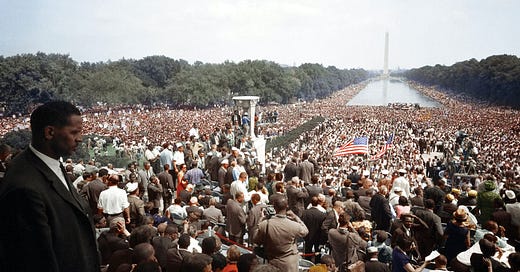Sixty years ago today, Peter, Paul, and Mary performed “If I Had a Hammer” and “Blowin’ in the Wind” at the March on Washington for Jobs and Freedom when Martin Luther King, Jr., delivered his historic “I have a dream” address. In 1983 the trio sang at the 20th anniversary. Peter and Mary were present at the 30th at which Mary recalled the 1963 march, “It’s hard to explain what palpable good is, but on that day people were sharing a feeling of goodwill, a tremendous sense of kindness, generosity, community among people looking to live the American dream, the dream of Jefferson, Lincoln, Paine. America was blooming that day.”
Peter and Noel participated in the 50th anniversary. Earlier that summer a Florida jury had acquitted George Zimmerman in the shooting death of 17-year-old Trayvon Martin. A newspaper account of the anniversary remarked that only a few speakers had mentioned the case, but the “most notable exception occurred” was when Peter Yarrow and Noel Paul Stookey invited Martin‘s parents to join them in singing “Blowin’ in the Wind.” They were also joined by Mark Barden, whose son Daniel had been killed the previous December at the Sandy Hook Elementary School.
A few days ago, Noel and I talked about the March on Washington, and here we share part of that conversation.
J: Now, 60 years later, what is the value of commemorating the March on Washington?
N: I think seeing the film clips from 1963 and recognizing such intense commitment to the civil rights movement will continue to have a great effect on younger generations. Film has an advantage over print in enlisting the empathy of the viewer, especially when there’s music involved.
J: How did the experience affect you personally?
N: Ultimately the march became a window into other inequities that existed. In the years following the march, Peter, Mary and I came to recognize that civil rights was just one expression of human rights and that the term “human rights” was a more accurate and inclusive description of issues represented by the women’s movement, the gay movement and the environmental movement.
The landscape has broadened considerably since the March on Washington, and in some ways, it's overwhelming. There are so many causes to address. It seems we can only give partial recognition and support to some of the pressing concerns that we share as a nation. Sometimes, all you can address is one person at a time, one sentence at a time. You realize that it's less about the politics, and more about the functional nature of the relationship between you and another human being and often best held in the arms of Love.
But getting back to the original question, where did the March of Washington on Washington lead? I think it broadened the capability of people to recognize injustice—perhaps even in their backyards or at the local grocery store—and to some extent increased their hunger to find a kind of peace with their neighbors.
J: You’re saying the empathy that seeing media accounts of the march might engender can have an effect across generations, even to the youngest.
N: Yes, so they begin to ask questions. What can I do to make this better? I'm not in Washington and I wasn't 18 years old in 1963. Where and what can I do best now? Those are the issues that were raised and I think have survived since the march.
J: At what point do people of faith take our understanding of love of neighbor and expand it to collective efforts for justice and human and environmental flourishing?
N: That's probably always been the issue—the interface between individual faith and group politics. And I don't think that there is a simple answer for it, particularly when there are multiple issues and each issue carries with it a set of circumstances that simultaneously have positives and negatives. That’s why the ‘vote’ in this country is such an important personal statement—it is our individual testament.
J: The effort gets messy, and some of us realize there are no simple, pure, unsullied solutions to complex societal problems.
N: I think that's the nature of the human experience. The chase for principles in a person's life is always there. And those guidelines to which we ultimately pledge allegiance are a byproduct of all the decisions—both good and bad—we've made in our lives. It seems to me that our personal principles should ultimately be expressed with compassion and respect for one another, an understanding of each other's point of view. Some people call it compromise.
J: You seem to be talking about the personal-relationship level. How does compromise at the personal level move a society toward justice? Laws that attempt to ensure justice in society have to be enacted by legislators who often refuse to compromise. At the March on Washington you, Peter, and Mary were singing to promote civil rights and economic equality.
N: That's how attention is brought to an issue, but I don't think anything is ultimately accomplished until it then becomes translated to action through voting. The media tends to focus on polls rather than on issues, and when you add deliberate disinformation into the social media mix, there is little hope for developing good solutions to complex problems. Polls don’t tell us whether the opinions are a passing fancy or based on thoughtful education and deliberation about the real issues. Public debate and voting, particularly locally, seems to be the only real substantive platform that we have to make real change.
Connections
Here is a PBS NewsHour clip of Noel and Peter’s performance at the 50th anniversary of the march, where they were joined by Trayvon Martin’s parents and by Mark Barden, whose son was killed in Sandy Hook Elementary School.
In this interview article from the August 2023 issue Hour Detroit magazine, Noel recalls his Birmingham (suburb of Detroit, MI) roots and Peter, Paul and Mary’s iconic performance at the March on Washington 60 years ago.
In this clip from the PBS Special, Peter, Paul, and Mary: Carry It On: A Musical Legacy, the trio and their music director Bob DeCormier reflect on their participation at the March on Washington. In it you will also see footage of their performance of “Blowin’ in the Wind” and “If I Had a Hammer.”
Photo by Unseen Histories on Unsplash







I believe firmly that solutions to the myriad of issues facing us today begins with each of us understanding what we individually believe, and how we can help our fellow man by furthering those beliefs We cannot fail to understand that we need to treat everyone as we would be treated. We cannot succumb to the misinformation that is abundant in all societies today. As for effecting change, to Noel's point, our right to vote (with understanding), is imperative.
Incredibly moving! Thank you for sharing the clips and the story.